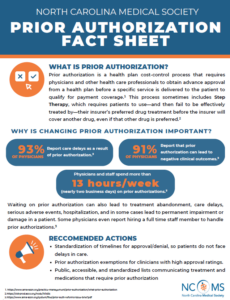 (AMA) — A bipartisan majority from both chambers of Congress is pressing the Centers for Medicare & Medicaid Services (CMS) to finalize a pending federal regulation that would overhaul prior-authorization requirements within Medicare Advantage.
(AMA) — A bipartisan majority from both chambers of Congress is pressing the Centers for Medicare & Medicaid Services (CMS) to finalize a pending federal regulation that would overhaul prior-authorization requirements within Medicare Advantage.
“We urge CMS to promptly finalize and implement these changes to increase transparency and improve the prior-authorization process for patients, providers and health plans,” wrote the lawmakers. “We are pleased that these proposed rules align with the bipartisan, bicameral Improving Seniors’ Timely Access to Care Act, which proposes a balanced approach to prior authorization in the [Medicare Advantage] program that would remove barriers to patients’ timely access to care and allow providers to spend more time treating patients and less time on paperwork.”
A bipartisan, bicameral letter to the Department of Health and Human Services (HHS) and CMS was anchored in the Senate by Sens. Sherrod Brown, D-Ohio, Roger Marshall, MD, R-Kan., Kyrsten Sinema, I-Ariz., and John Thune, R-S.D. Meanwhile, the effort in the House of Representatives was led by Reps. Suzan DelBene, D-Wash., Mike Kelly, R-Pa., Ami Bera, MD, D-Calif., and Larry Bucshon, MD, R-Ind. These same eight lawmakers introduced the Improving Seniors’ Timely Access to Care Act.
Ultimately, 61 Senators cosigned the letter, along with 233 House members. The AMA helped spearhead support for the letter. The AMA’s Physicians Grassroots Network and Patients Action Network worked to ensure a robust number of members of Congress cosigned this important communication to CMS.
The congressional majority also urged CMS to expand on the proposed rule by:
- Establishing a mechanism for real-time electronic prior authorization decisions for routinely approved items and services.
- Requiring that plans respond to prior-authorization requests within 24 hours for urgently needed care.
- Requiring detailed transparency metrics.
While all of these concepts are explored in the CMS proposed prior-authorization rule that was released last December, the letter provides the agency with an additional push from Congress to include these strengthened policies in the final regulation. The opportunity for outside stakeholders to provide feedback on proposed rule closed in March and AMA submitted detailed comments (PDF) that largely supported the vast majority of the concepts included in the proposed rule.
Why it’s important: While payers claim that prior-authorization requirements are used for cost and quality control, a vast majority of physicians report that the protocols lead to unnecessary waste and avoidable patient harm. One-third of the 1,001 physicians surveyed (PDF) by the AMA in December reported that prior authorization has led to a serious adverse event for a patient in their care.
More specifically, the AMA survey found that these shares of the physician respondents reported that prior authorization led to:
- A patient’s hospitalization—25%.
- A life-threatening event or one that required intervention to prevent permanent impairment or damage—19%.
- A patient’s disability or permanent bodily damage, congenital anomaly or birth defect, or death—9%.
The Improving Seniors’ Timely Access to Care Act would help fix prior authorization within Medicare Advantage, and the legislation was strongly supported by the AMA, which played a major role in securing enough co-sponsors to ensure the bill passed the House of Representatives (PDF) last September. The legislation, however, stalled in the Senate due to a flawed $16 billion cost estimate from the Congressional Budget Office (CBO).
The Biden administration’s pending prior-authorization regulation provides a key pathway for overcoming the high price tag associated with enacting the legislation. If the final prior-authorization regulation includes a mechanism for issuing real-time decisions, requirements to complete emergency requests within 24 hours, and detailed transparency metrics, then these policies must in turn be incorporated into CBO’s baseline estimate for the legislation.
That could mean a big drop in the agency’s $16 billion cost estimate for the legislation, thus upping the odds of congressional passage.
Learn more: Patients, physicians and employers can learn more about reform efforts and share personal experiences with prior authorization at FixPriorAuth.org.

ADDITIONAL READING:
Bills in 30 states show momentum to fix prior authorization
Advocacy in action: Fixing Prior Authorization
1 in 3 doctors has seen prior auth lead to serious adverse event
